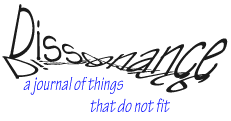
What's DISS?
© 1996 by
Richard Rath
DISSONANCE is for ideas that cross boundaries, or things that don't fall neatly in a category. The need for its existence became clear during our work in activism, music, academia, art, and politics. Often, something that works in one place is deemed inappropriate in others. Perhaps a theory does not work when it meets experience. Worse, perhaps a group of theorists refuse to accommodate the realities of those theorized, choosing to stay in a state of empowered ignorance, if only — like the dogs of the old joke — 'because they can.'
We have known the sting of finding that our ideas, our experiences — our souls, if you will — do not fit into a grand discourse, whether that of North America/Europe's liberal tradition (in the broad sense of that idea, which includes "conservatives" as much as "liberals"), western enlightenment thought, or even multicultural radicalism on occasion. We wonder about standards and power when the all-inclusive 'the people' does not include us or our voices. We know this exclusiveness to be ignorance, not enlightenment.
We have witnessed this 'unfitness' in many settings.
- In mainstream politics, where the interests of "minorities," poor people, and women are subsumed, even appropriated, into a vision that protects the privileged, perhaps offering handouts in return for the right to tokenize and speak for.
- In the academy, when ideas from one discipline or subdiscipline encroach upon the turf of another (GRRRRR yip yip yip bark the intellectual poodles).
- In our identities when we fail to mold ourselves — or be molded — to stereotyped ethnic groups, societal roles, gender expectations, or even just a prevailing aesthetic.
We have long felt a profound dissonance in these settings, in the odd discovery that our beliefs, our lives, our hopes are deemed unfit, off the mark, not right. DISSONANCE seeks to share that feeling with you. Such a besieged thing has its strengths just by the fact of its existence. The feeling of dissonance leads to uncertainty, to self-examination, to a certain tempering of expectations. It need not lead to silence collapsing in upon itself. Although that is a constant possibility, that silence is submission; it is not the feeling — or the tenor — of dissonance.
No, dissonant folk like ourselves can make quite a racket, and we intend to. Join us if you can. Otherwise, we hope for you to hear from us.
— The dissonant folk, May 28, 1996.
